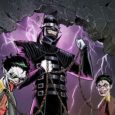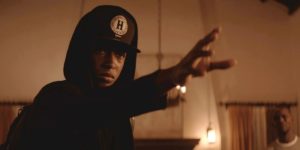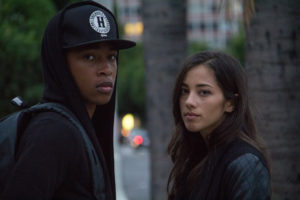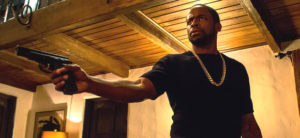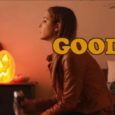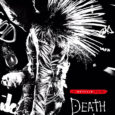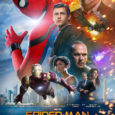March 26, 2014 was a sad day in television as it marked the final episode of Psych on USA Network. Millions of fans across the country thought that was the last they’d see of Shawn Spencer and Burton Guster, the duo responsible for the titular psychic detective agency. Little did we Psych-Os know the showrunners had another trick up their sleeve: a movie. Airing on December 7th, Psych: The Movie reunites the bulk of the main cast and I, for one, couldn’t be more excited.
In preparation of the movie, I sat down and revisited all 8 seasons of Psych, which was no easy task since the show was removed from Netflix and I had to watch everything on DVD. Can you imagine swapping out all those discs as each episode ended? It was exhausting.
Anyway, here are my picks for the top 15 episodes of Psych. Wait for iiiiiiit…
—————————————————————————————————————————–
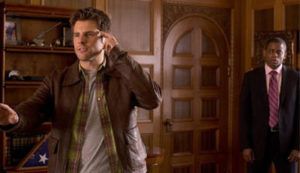 Pilot
Pilot
Season 1, Episode 1
Pilot episodes usually aren’t the best episodes of any series; it often takes time for the characters’ personalities to gel and worm their ways into our hearts. But in the case of Psych, the characters are pretty much as they are fresh off the page. Shawn Spencer (James Roday) is lazy and unambitious despite his gift of hyper-perception and deductive reasoning. He uses this gift to call in numerous tips to the police in an effort to collect reward money but when the cops start to suspect him as the culprit, his only out is to feign psychic powers. Though he’s met with some skepticism, courtesy of Santa Barbara head detective Carlton Lassiter (Tim Omundson), he convinces the interim police chief Karen Vick (Kirsten Nelson) to bring him on a case. At that point, Shawn drags his best friend and enabler Burton “Gus” Guster (Dulé Hill) along for the ride. We also get a look at Shawn’s strained relationship with his father, Henry (Corbin Bernsen), an ex-cop who is not too happy with Shawn lying to the cops, but when he goes to bat for Shawn and reveals what he’s willing to do for his kid.
—————————————————————————————————————————–
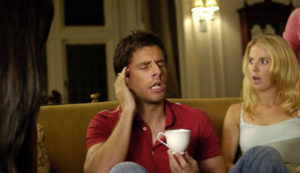 Scary Sherry: Bianca’s Toast
Scary Sherry: Bianca’s Toast
Season 1, Episode 15
When a sorority hazing goes badly and ends with the death of a college girl, the incident is written off as a copycat suicide based on the death of Santa Barbara’s urban legend, Scary Sherry. Juliet (Maggie Lawson), however, goes undercover in the sorority to investigate deeper, asking Shawn and Gus for help. “Scary Sherry: Bianca’s Toast” doesn’t feature any big name guest stars or off-beat musical improv but the teacup scene is one of the funniest moments in the show and I’m including it on this list for that alone. Also, the B-plot with Lassiter training an elder rookie has some great moments.
—————————————————————————————————————————–
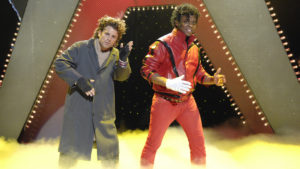 American Duos
American Duos
Season 2, Episode 1
When a judge on the hit singing competition reality show “American Duos” has a few brushes with death, he goes to the Santa Barbara police for protection. A parody of Simon Cowell, Nigel St. Nigel is portrayed to perfection by a smug Tim Curry and his performance carries the episode. Bonus points for the second special guest star, Gina Gershon, playing a booze-riddled and absent-minded former pop star, a clear lampooning of Paula Abdul. Bonus bonus points for the episode also giving us James Roday and Dulé Hill dressed as Roland Orzabal and Michael Jackson while performing Tears for Fears’ “Shout.”
—————————————————————————————————————————–
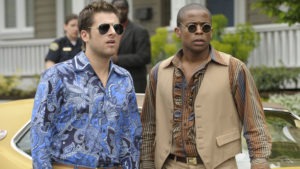 Disco Didn’t Die. It Was Murdered!
Disco Didn’t Die. It Was Murdered!
Season 3, Episode 5
“It’s a big birthday cake!” Taking its influence from the pop culture of the 70s, including shows like The Mod Squad and movies like Shaft, Shawn and Gus are called in to find new evidence in a case that was recently overturned, which just so happened to be the biggest case of Henry Spencer’s career. The trio need to track down clues which brings smack dab into the middle of the 70s; from the polyester shirts to a ’73 Mercury Cougar to a 70’s-themed disco run by a dude named “Pookie,” “Disco Didn’t Die” hits all the notes to fan the flames of nostalgia in the most humorous way possible.
—————————————————————————————————————————–
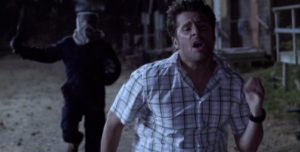 Tuesday The 17th
Tuesday The 17th
Season 3, Episode 15
Written and directed by James Roday, “Tuesday the 17th” is the first episode that takes film homage to the next level by taking influence from classic horror movies. When an old camp friend approach Shawn and Gus to investigate the disappearance of a counselor at his new camp, they soon find themselves being stalked by a masked slasher. But the swerve, that the camp is meant to be a murder mystery camp where people figure out the identity of the killer, is met with another swerve, wherein a real killer is picking off the counselors one by one. The episode features almost every horror movie trope known to man and, in general, has a ton of fun with the premise.
—————————————————————————————————————————–
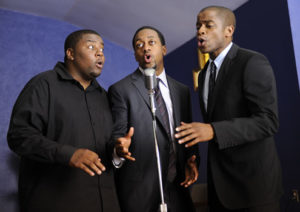 High Top Fade-Out
High Top Fade-Out
Season 4, Episode 7
There are a lot of things to point to as making “High Top Fade-Out” a great episode. It features guest appearances by Jaleel White and Kenan Thompson as old college friends of Gus, as well as 50% of Gus’s college singing group, Blackapella. Tony Todd also makes an appearance though slightly less Candyman and more undercover cop. The episode marks the introduction of Kurt Fuller as coroner Woodrow Strode, a character that would make multiple appearances through the series and become more off the wall each time. The intro song was rerecorded by Boyz II Men as a way to cement the singing quartet theme. But probably my favorite part of the episode is Dulé Hill’s performance. Though he’s never been a slouch in any episode, he emotes a full range from anger to pain to concern as he works to repair his relationship with his friends. Every minute of it is fantastic.
—————————————————————————————————————————–
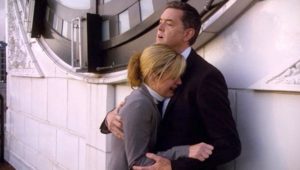 Mr. Yin Presents…
Mr. Yin Presents…
Season 4, Episode 16
The second episode in the Yang trilogy, “Mr. Yin Presents…” is a love letter to Alfred Hitchcock. The murder of a waitress leads Psych and the police to discover that Yang was working with a partner, the mysterious Mr. Yin. After Shawn fingers Mary Lightly (Jimmi Simpson) as the killer, he realizes how wrong he is when Mary winds up dead, murdered in the same manner as Detective Arbogast from the Hitchcock film Psycho. The gang soon find themselves in a trap, each playing a role from different Hitchcock movies; Shawn as L.B. Jefferies from Rear Window, Henry as Mark Rutland from Marnie, etc. The episode is filled with references to Hitchcock, both visual and in dialogue. It’s a fantastic watch and leads to some great character development for the rest of the series.
—————————————————————————————————————————–
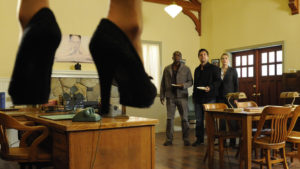 Dual Spires
Dual Spires
Season 5, Episode 12
Despite the recent revival, Twin Peaks was one of those cult shows that had a rabid fan base but never really struck a chord with the culture at large. The showrunners of Psych however, found enough to work with and centered an entire episode around its atmosphere. Featuring many of the original stars of Peaks, “Dual Spires” plops Shawn and Gus in the center of a small mountain town where the people are a little off-beat, forcing them to dig through the residents’ idiosyncrasies to discover the truth behind the murder of a young woman. Dana Ashbrook, Ray Wise, and Sherilyn Fenn all make appearances, as well as Chris Isaak’s “Baby Did a Bad Bad Thing” in a nod to the 1992 Twin Peaks movie, Fire Walk With Me.
—————————————————————————————————————————–
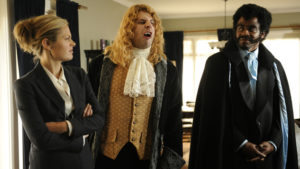 This Episode Sucks
This Episode Sucks
Season 6, Episode 3
Don’t let the title fool you; the episode is actually pretty good. Admittedly, I almost didn’t put it in but the more I thought on it, the better it became. This is the vampire episode and the showrunners went all in making that apparent. The episode not only guest stars Kristy Swanson and Corey Feldman, both vampire famous in their own right, but Tom Lenk show ups, who had a recurring role in the Buffy TV series. “This Episode Sucks” essentially benches Shawn and Gus, relegating them to second fiddle as they freak out over the idea of vampires in Santa Barbara (though they do dress up as famous vampires; Shawn as Lestat and Gus as Blacula). Despite all of that, I like this episode as it gives Lassie a chance to shine. It introduces Marlowe as his love interest which sets up his character arc for the remainder of the series. Shawn and Gus may be the protagonists of the show but it’s nice when some of the other characters get the spotlight.
—————————————————————————————————————————–
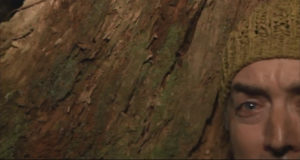 Lassie Jerky
Lassie Jerky
Season 7, Episode 3
There’s no denying the impact found footage films have had on the movie industry. Luckily, the writers of Psych recognized this and blessed us with their own take on the genre. Wrapped around the search for Bigfoot, “Lassie Jerky” finds Shawn and Gus in the woods with some college film students when they stumble upon three dead bodies. The episode is a masterpiece shot from all first-person perspectives and perfectly homages the classic found-footage film, The Blair Witch Project. It also guest stars WWE’s Big Show and has probably my favorite scene in the entire series, an impromptu acapella rendition of the Bangles’ “Eternal Flame.”
—————————————————————————————————————————–
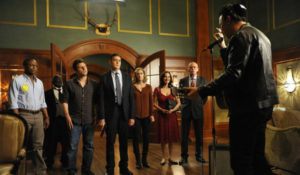 100 Clues
100 Clues
Season 7, Episode 5
The landmark 100th episode of the series. Shawn gets himself invited to a dinner party in a swanky mansion and tries to smooth his relationship woes with Juliet. When she can’t make it, he brings Gus along and discovers that the party was thrown by a recently released from jail rock icon, Billy Lipps, with all of the party guests tied to the case that sent him to prison. A riff on the movie Clue, “100 Clues” was promoted with a real-time contest that allowed viewers to choose who the killer of the episode really was by using a special hashtag on Twitter. Much of the humor in the episode is based on Clue and also includes three of the film’s stars as guest stars: Leslie Ann Warren, Martin Mull, and Christopher Lloyd.
—————————————————————————————————————————–
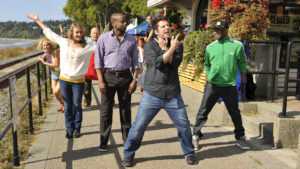 Psych: The Musical
Psych: The Musical
Season 7, Episodes 15 & 16
This might be cheating a bit as it spans two episodes but “Psych: The Musical” originally aired as a 2-hour special so suck it, I’m counting it. Though I’m not a fan of musicals, I wholly enjoyed this episode, if only because of how they made each of the musical interludes diegetic. Shawn and Gus are tasked with tracking down an escaped mental patient, a deranged writer who learns that a version of his play based on the Jack the Ripper murders, is premiering at the local playhouse. There are a number of highpoints in the episode, including the return of Ally Sheedy in her role as Yang, Anthony Rapp, best known for as Mark in Rent, and Dulé Hill as “Jamaican Inspector Man.”
—————————————————————————————————————————–
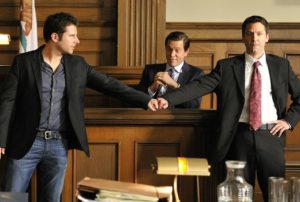 Remake A.K.A. Cloudy…With a Chance of Improvement
Remake A.K.A. Cloudy…With a Chance of Improvement
Season 8, Episode 3
One of the more off-beat episodes of the entire series sees the gang remaking an episode from the first season as a commentary on Hollywood’s remake culture. “Cloudy…With a Chance of Murder” focused on a school teacher who was charged with the murder of the local weatherman, with Shawn and Gus assisting her legal team in getting her acquitted. “Remake” follows that same premise but peppers it by recasting the guest stars, many of whom had already appeared in other episodes as completely different characters. Thankfully, they also saw fit to change the murderer and the method behind the murder, so as to deliver an almost new mystery. My favorite part, though, was the appearance of Ed Lover as the court bailiff and his delivery of the classic “come on, son” line.
—————————————————————————————————————————–
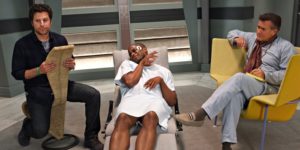 Nightmare on State Street
Nightmare on State Street
Season 8, Episode 9
I really seem to like the episodes that homage classic horror movies, huh? Anyway, “Nightmare on State Street” has a lot going for it, most notably guest star Bruce Campbell. The film focuses on Gus’s nightmares, which stem from Shawn’s absence and leads directly into the end of the series. As such, the episode devotes significant time to A Nightmare on Elm Street, and more than just the title. But the episode also references Night of the Living Dead and Texas Chainsaw Massacre, all while framed within Gus’s dreams. Other guest stars round out the fun, such as Dean Cameron, who played Chainsaw in one of Shawn’s favorites, Summer School, William Zabka, a.k.a. Johnny Lawrence from Karate Kid, and Phylicia Rashad, who returns as Gus’s mother. “Nightmare on State Street” aims for horror lovers and hits the mark with its numerous references. Oh, and zombie Curt Smith.
—————————————————————————————————————————–
 The Break-Up
The Break-Up
Season 8, Episode 10
I really needed to add the series finale here, mostly because of how well it ties up each characters’ arc. Shawn has a difficult time telling Gus that he’s moving to San Francisco to be with Juliet, especially after Gus manages to find a new job and get his life back on track. This episode shows the depths of Shawn and Gus’s relationship, with Shawn blaming himself for disrupting Gus’s life but Gus uprooting himself to be with his best friend. It also gives us closure to Lassie’s respect for Shawn when he refuses to listen to Shawn’s video confessional that he’s not a real psychic despite years of Lassie’s skepticism. We also get to see McNab finally promoted, assuming the title of detective despite having the worst score Lassie has ever seen. All of this is wrapped up alongside guest appearances by two actors idolized by Shawn; Billy Zane and Val Kilmer. “The Break-Up” is an emotional finish to a hilarious train ride and, in my opinion, the perfect way to end the series.
—————————————————————————————————————————–
Boom boom boom… Wrap up! I know a lot of my fellow Psych-Os out there may disagree with a few of my choices, which is fair. Narrowing down a list like that has been one of the hardest things to do, especially with a show as diverse as Psych has been through the years. So hey, if you disagree with me, let me know! What is your favorite episode? And what are you most excited for from the upcoming movie? Feel free to drop a comment down below or you can find me on Twitter, @IdiotAtPlay, and tweet me your picks.
Sleight is one of those movies that almost flew completely under my radar. Despite premiering at Sundance in 2016, I hadn’t heard of it until a tweet showed up in my Twitter timeline. I forget its contents now but the retweeter, Dulé Hill of Psych fame, was promoting the film. Which makes sense considering he’s one of its stars. As a fan of Hill, my interest was piqued.
The movie focuses on Bo, relative newcomer Jacob Latimore, a brilliant kid with a penchant for science. He was forced to drop out of school after his mother died to take care of his younger sister, Tina (Storm Reid). During the day, Bo works as a street magician, performing simple card tricks and levitating items for tourists in the busy parts of LA. But at night he hustles drugs for a local kingpin, Angelo (Hill).
For the most part, his life is going well. His bills are paid, his sister is doing well in school. He even meets a girl, Holly (Seychelle Gabriel). But when Angelo asks him for a “favor,” his golden life starts to tarnish, and he sees that the man he’s working for is not the friend he thought he once was.
Directed and co-written by J.D. Dillard, Sleight really delves into the character of Bo, working hard to make sure the audience really understands what he’s going through. Unfortunately, it does this to the detriment of the rest of the cast. We get a small look into Holly’s home life, with lines that quickly explain away why she’s not as happy as she should be. Antagonist Angelo is a trope-fueled gangster; we never learn why he’s as sadistic as he is, but it turns out it’s never important to the plot. All that matters is that he put Bo in a certain position and all we are supposed to care about is how he’s going to get out of it.
Sleight does do something very right, and that’s the aspect of Bo’s “magic.” We see early on that things may not be what they seem and as the film progresses, our suspicions are confirmed. However, we spend so much time wondering just what is happening that by the time everything comes to a head, the finale seems anti-climactic. Everything that the movie worked up to, the final confrontation that I was looking forward to, was over in five minutes, leaving me with a “that’s it?’ feeling.
The film’s marketing is my biggest gripe with Sleight. The movie billed itself as a super hero film (it was referred to as “Chronicle meets Iron Man”) but it never actually feels that way. Sure, it contains a few elements of super heroism, like the source of Bo’s mysterious “powers.” But at its core it’s a character study. It’s a tale of revenge and redemption. We see a smart kid like Bo get stuck in a harrowing situation due to factors outside of his control, forcing him to do something stupid to try and pull himself out, only to get mired deeper into it. Yes, Bo can do some amazing things but that doesn’t make him a super hero and billing him as such denigrates the achievements of his character.
All that aside, Sleight is a beautifully directed film. Dillard uses natural light as often as possible, probably as a way to keep the production budget down but he does so in a way that makes the film more interesting to watch. Even his framing of characters in certain scenes added life to otherwise static moments; talking heads aren’t very interesting but if they’re shot from the right angle, we can be enraptured.
The acting in Sleight deserves a nod as well. Latimore was perfect in the role of Bo, coming off as cocky in his magic scenes but then awkward and unsure when he’s with Angelo or Holly. Seychelle Gabriel was also a joy to watch; Holly’s backstory didn’t lend much depth to the character but Gabriel manages to keep her interesting, mostly through Holly’s rapport with Bo. It’s a shame Holly was only used as a crutch for Bo. I would have liked to have dived deeper into her character.
Dulé Hill was one of the oddest characters to see in this film. As an actor who generally only plays nice guys, like Gus in the aforementioned Psych, seeing him as the tough-as-nails, sadistic drug czar was certainly a change of pace. At times, it even seemed awkward to hear him drop F-bombs and get physical with other characters. Unfortunately, Hill’s portrayal of Angelo felt a little stilted, like he was trying to make the character his own instead of drawing upon inspiration from other badass drug dealers in early cinema. Which is fine, but when every other aspect of the character is derivative of a hundred other films out there, it doesn’t jibe too well. That said, Hill did well with what he was given.
I’m happy that I saw Sleight early in its release and I do give it credit for what it was trying to do. However, having one interesting character in a cast of overused clichés doesn’t make for a very compelling film. Pair that with marketing that doesn’t wholly apply and you have a recipe for a movie that is bound to disappoint some people. Despite all of that, the character of Bo make it an interesting film, one that I would recommend if you have some free time.
Grade: B-





